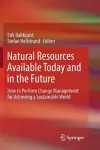
Natural Resources Available Today and in the Future
2 contributors - Paperback
£109.99
Dr. Erik Dahlquist is Professor of Energy Technology and Research Director of the School of Business, Society & Engineering at Mälardalen University in Sweden. He has been Dean of the Department of Natural Science and Technology at Mälardalen since 2004. Dr. Dahlquist also worked for twenty years in the power industry, holding a number of research and management positions with ABB/Alstom Grid. Dr. Dahlquist’s current research foci include Process Development for Renewable and Sustainable Energy Products, Energy and Efficient Power Load Management for Grids and Buildings and Environmental Management.
Dr. Stefan Hellstrand is PhD Energy and environmental engineering, PhLic Systems ecology - Natural resource management and MSc Agriculture - Animal husbandry. He has during more than three decades combined academic work with advanced consultancy. Reality itself has been utilised as a laboratory of reality, to which specific questions is asked, where the answers express the relevance and robustness of the academic work. Simultaneously customers are introduced to knowledge at the scientific frontier or ahead of it, where they decide by themselves whether it is for the benefit of their organisation to take the chance and risk to utilise it. This represents a process for methodological development where the commercial market is used as a prober in the academic work, at the same time as short- and long-term objectives of customers are fulfilled. Through this process a tool-kit supporting a sustainable development have emerged, that when applied in reality has contributed to sustainable intensification, supporting 14 of 16 environmental quality objectives in Sweden, several of the eight Millennium Development Goals, and with the capacity to support the 17 UN Sustainable Development Goals. Through these tools causal chains can be followed in systems characterised by mutual dependencies between systems and systems levels, thresholds, irreversibilities; i.e. the complexity of life as a defining systems characteristics. This integrates agricultural sciences, system ecology, economic theory, applied environmental sciences, life-cycle assessment and integrative assessment.